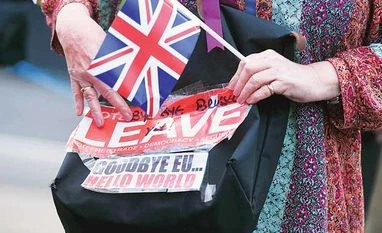Nearly a year on from the Brexit vote that caused markets to start worrying about political risk, the U.K. is still the best in the business of supplying uncertainty. Investors should expect rocky political times to continue—especially as Brexit talks loom.
A general election that looked like a walk in the park for Prime Minister Theresa May —based on opinion polls when the snap vote was called in April—has turned out to be another shocker. While the final votes are being counted, it is clear the Conservative Party flubbed its expected big majority and moreover faces a hung parliament.
It is another example of markets worrying about political risk in all the wrong places. Brexit and Trump were shocks. Jitters around elections in France and the Netherlands passed without incident.
The political fallout raises new questions about the U.K.’s exit from the European Union. The theory that markets, and particularly the pound, embraced when the election was called was that a clear victory for Mrs. May would give her greater room to maneuver in negotiations on Brexit, thus reducing the risk of a disorderly exit.
What is more, the clock is ticking and the election has taken up valuable time. With the two-year process of exit having already started at the end of March, when the U.K. officially notified the EU of its decision to leave, nearly one-tenth of the allotted time for talks has already passed. This could get worse if it takes time for a U.K. government to form.
Mrs. May spoke early Friday morning of the need for a “period of stability” but that seems to be code for more uncertainty, including perhaps a fresh leadership fight among the Conservatives and possibly even another election before too long. The outcome is almost certainly unsettling for markets. Sterling certainly proved unstable, falling more than two cents against the dollar to $1.273. This may prove to be too high considering the challenges ahead.
Investors usually get a break from politics after an election, and new governments a honeymoon period. Neither seem likely to have that luxury in the U.K. this year.
Source: The Wall Street Journal
To read the full story, Subscribe Now at just Rs 249 a month
Already a subscriber? Log in
Subscribe To BS Premium
₹249
Renews automatically
₹1699₹1999
Opt for auto renewal and save Rs. 300 Renews automatically
₹1999
What you get on BS Premium?
-
Unlock 30+ premium stories daily hand-picked by our editors, across devices on browser and app.
-
Pick your 5 favourite companies, get a daily email with all news updates on them.
Full access to our intuitive epaper - clip, save, share articles from any device; newspaper archives from 2006.
Preferential invites to Business Standard events.
Curated newsletters on markets, personal finance, policy & politics, start-ups, technology, and more.
Need More Information - write to us at assist@bsmail.in
)